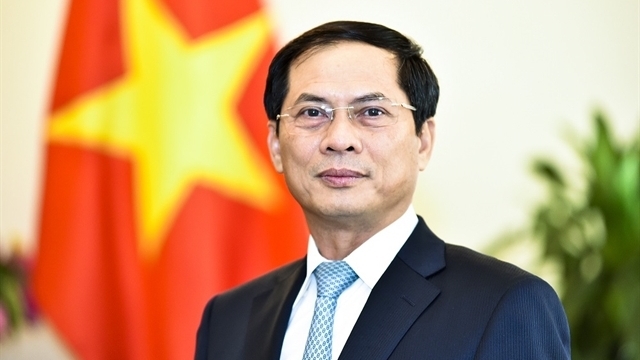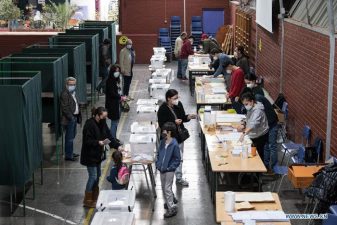|
NDO – Member of Party Central Committee and Permanent Deputy Minister of Foreign Affairs Bui Thanh Son recently wrote an article in which he underscored the great contributions made by the diplomatic sector in the cause of national construction and defence as well as the country’s renewal and international integration process. The following is the full text of the article. |
|
Over the past nearly 35 years of the Doi Moi (Renewal) process initiated and led by the Party, the country has accomplished great achievements of historical significance. Party General Secretary and President Nguyen Phu Trong once stated that Vietnam has never had such a high position, potential and prestige like at present. In the cause of national construction and defence, renewal of thinking is an indispensable requirement, in order to better adapt to the constantly changing reality and realise the nation’s aspiration to rise. President Ho Chi Minh is considered the lighthouse of thought renewal. Recognising the importance of contact with the outside to renew inner thinking, from the beginning of the 20th century, Uncle Ho went abroad to find a way to save the country. By grasping the trend of the times, combining internal resources with external forces, he and the Party led the Vietnamese people to defeat their colonial and imperialist aggressors. His thought enlightened and drove the national revolutionary cause from one victory to the next. Following in his footsteps, the diplomatic sector has the opportunity to regularly meet and contemplate the trends of the world, thereby creating a foundation for the process of renewing thinking in accordance with the situation and conditions in the country. With the foundations of Marxism-Leninism and Ho Chi Minh thought, Vietnam’s diplomatic thinking has been consistently innovated, developing and inheriting traditional values and national identity as well as absorbing humankind’s quintessence in order to serve the supreme benefit of the nation and people. The process of renewing diplomatic thinking from 1986 up to now Renewing external thinking is an innovation in assessing the international situation, in planning and implementing foreign policy so as to better protect and promote national interests. This has been clearly shown in the stages of renewal, from breaking the embargo (1986 – 1995) to expanding relations and international economic integration (1995-2010) and the period of developing relations in a substantial and in-depth manner as well as comprehensive international integration (2011 – present). In the spirit of “looking straight into the truth, evaluating it correctly, and telling it in a black-and-white manner,” the 6th National Party Congress in December 1986 charted out the policy of a Comprehensive National Doi Moi, marking an important watershed in the transition to socialism in Vietnam. Since then, Vietnam has gradually broken the embargo, and implemented a foreign policy of independence, self-reliance, openness, diversification and multilateralization of external relations, as well as being a trusted friend and partner and a responsible member of the international community. Vietnam in turn normalised relations with China (1991), the US (1995), promoted relations with neighbouring countries and countries in the region and around the world; while at the same time, step by step joining important regional, inter-regional and international organisations, such as ASEAN (1995), ASEM (1996), APEC (1998), WTO (2007), etc. The next important milestone in renewing diplomatic thinking was the Resolution adopted at the eighth meeting of the Party Central Committee (9th tenure) in 2003 with a new perspective on partners and subjects, cooperation and struggling. Accordingly, Vietnam has made efforts to increase similar points, neutralise differences and promote strong relations with other countries, especially the establishment of a network of strategic partners, becoming comprehensive partners with 30 countries in the world. Thinking on international integration has developed strongly. From concerns about “renewal leading to revolution”, “integration leading to dissolution”, Vietnam has developed strong international economic integration and then comprehensive international integration across all fields while at the same time handling the relationship between independence and self-reliance with active international integration well. In terms of economic integration, the country’s participation in high quality free trade agreements (FTAs) such as CPTPP, EVFTA has helped create tremendous momentum for growth. On national defence, Vietnam has sent hundreds of soldiers to join UN peacekeeping forces, demonstrating the country’s sense of international responsibility. The integration of politics, security, society, culture, science and technology has been strongly promoted, helping to promote national benefits. Multilateral diplomatic thinking has assisted many important developments. The 12th National Party Congress in 2016 set out the motto to actively and proactively contribute to building and shaping multilateral institutions. Directive No.25 of the Secretariat (August 2018) specified this motto, while underscoring efforts to rise to play a key, leading and mediating role in important forums and multi-organisations in accordance with specific capacities and conditions. In its practical implementation, multilateral foreign affairs projects have made great effort to contribute positively and effectively, with many ideas and initiatives, highly appreciated by international friends, especially in the role of the APEC host in 2017, ASEAN Chair in 2020, a non-permanent member of the United Nations Security Council (UNSC) for the term 2020-2021, and the host of the 2nd DPRK-US Summit in 2019 and so on. The renewal of diplomatic thinking is also reflected in the continuous improvement of the national interests. The 12th National Party Congress stated that it is a must to ensure supreme national interests on the basis of the fundamental principles of international law, equality and mutual benefit. The national interests of Vietnam are not selfish and narrow, but are determined on the basis of the fundamental principles of international law, equality and mutual benefit. Ensuring the national interest must be the supreme principle of all diplomatic activities. Diplomacy is an important driving force for national development and thought renewal Along with the aforementioned process of thought renewal, the foreign sector has gained important achievements, contributing to the process of innovative thinking in all fields and creating favourable conditions for successfully implementing the renewal cause. Firstly, the diplomatic sector has successfully implemented the tasks assigned by the Party and the State, effectively contributing to strengthening an environment of peace, stability, safeguarding the country from afar and from the earliest moments; at the same time, taking advantage of external resources (market, capital, science and technology, quintessence of mankind’s culture) for sustainable development, raising the international position of the country, and successfully implementing the cause of renewal. Secondly, the diplomatic sector has contributed to the research and assessment of the nature of the era, international trends and circumstances, and directly participated in the process of planning and implementing policies to serve the cause of national construction and defence. From the early days of the renewal process, resolutions and documents on foreign affairs have contributed to creating many breakthroughs in thinking, pointing out the characteristics of the political, security, external and economic environment of the country, thereby devising correct and timely policy recommendations, helping the country seize and take advantage of opportunities and effectively handle challenges from a constantly changing international environment. Thirdly, the diplomatic sector has also contributed to renewing the thinking in other sectors and fields. In the course of implementing foreign affairs activities, the Party, the State, parliament, and person-to-person diplomacy have had the opportunity to share and learn from the experiences of the world, thereby raising awareness and promoting a more complete innovation in the fields of socio-economic life, culture, education, the environment and new fields such as climate change, the fourth industrial revolution, and cyber security. Fourthly, the diplomatic sector has contributed directly to domestic socio-economic development through rich and effective economic diplomatic activities, especially through advising the Party and State on major undertakings related to international economic integration, including joining the network of 16 FTAs in order to create a momentum for growth. This economic diplomacy has accompanied and assisted localities and businesses in their efforts to access and expand markets abroad, thereby contributing effectively to the sustainable and creative development of the country. Towards the 13th National Party Congress, the entire Party, people and army are striving to realise the nation’s aspiration for a strong, prosperous and high-ranking Vietnam in the international community in the context of a world situation changing so rapidly with the complicated and unpredictable developments caused by the COVID-19 pandemic. Therefore, the diplomatic sector needs to constantly monitor and grasp the trends of the world, continue to innovate its mindsets and actions, so as to overcome all difficulties and fulfil all assigned tasks. As Party General Secretary Nguyen Phu Trong advised at the 2018 Diplomatic Conference, it is necessary to think and act at both regional and international levels. The diplomatic sector will continue to uphold this tradition, worthy of being a pioneer in strengthening a peaceful and stable environment while making practical contributions to the cause of national renewal, construction and defence. Source: Nhan Dan Online
|


